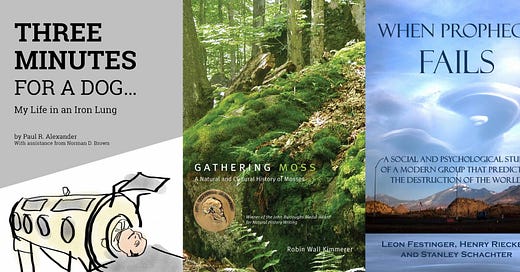3 Curious Short Non-Fiction Books for the Weekend
Three odd quick-reads that will leave you scratching your head.
Sometimes it's nice to have a short book to read which can be finished in an afternoon. In this article I share three short and rather different books. What do these books have in common? Well, they're all short, and they leave you scratching your head a bit, wondering "Huh...?" These books won't be the ones seen on any top 10 list, but somehow they've each left a lasting impression on me.
In the late 1950s, Paul Alexander contracted Polio at the age of 6. It left him paralyzed for life, being only able to move his mouth and head, and requiring the assistance of an "Iron Lung" to help him breath. He survived Polio and went on to get a law degree and even litigated cases. At age 74 he self-published his memoir, Three Minutes for a Dog: My Life in an Iron Lung. According to an article in The Guardian, "It took him more than eight years to write it, using the plastic stick and a pen to tap out his story on the keyboard, or dictating the words to his friend". 🤯
The paperback is 156 pages. Imagine typing or dictating that all out. To be frank, the writing itself isn't all that great, and the editing is sometimes questionable—when compared to other books, anyway. Occasionally there are even abrupt ends, or incomplete sections. Sometimes it makes for a bit of a bizarre reading experience—you can almost imagine Alexander tapping out each word with his plastic stick, and I suppose this might help explain some of the editorial choices—perhaps left intentionally to convey the authors difficulty writing the book.
The book is short enough that its occasional lack of polish doesn't become a drag. An easy read, but one which has somehow stayed with me.
Robin Wall Kimmerer is a biologist who writes flowery poetic prose, part scientific and part anthropological, often infused with Native American tradition (she is Potawatomi) and reflections on heritage. One of her books is Gathering Moss: A Natural and Cultural History of Mosses.
It's... well, it's a book about moss, sort of, I guess? I know. You're hooked! The book weaves together genuinely interesting facts about moss (which is not an oxymoron!) with thoughts about the modern world, culture, and our more ancient ancestral heritages. It meanders, and the writing is often quite lyrical, leaving you feeling like you're floating on a soft fluffy cloud... of moss. A green fluffy moss cloud.
Admittedly, it's not my most favorite books. Not even close. Yet somehow, it continues to occupy space in my head, following me around ever since I read it half a year ago. And now, I can't stop seeing moss everywhere.
At 168 pages for the paperback, it makes for an easy afternoon read which is well worth this short amount of time.
Three social psychologists and some graduate students join a UFO doomsday cult. Is this the premise for the next blockbuster movie out of Hollywood, or a research study done in 1954? Yep! It's the second one. When Prophecy Fails: A Social and Psychological Study of a Modern Group that Predicted the Destruction of the World by Leon Festinger, Henry W. Riecken, and Stanley Schachter chronicles their experience, from how they first heard about the cult, to joining it, to what happened when the cult's doomsday prophecy didn't come true, and then didn't come true again when they changed the prophecy... and then didn't come true yet again when they modified their prophecy again, and again...
What I found curious about this book is the premise. A bunch of social psychologists hear about a doomsday cult and then proactively work to get inducted into the group, becoming participating members walking the fine line between being a passive member, trying to avoid being influential while not raising the suspicions of others in the group. Then, as their prophecy doesn't come true, participate passively as the cult makes excuses and modifies their prophecy. It's so wacky. Imagine keeping a straight face. Possibly more bizarre is trying to write up a serious scientific report on the whole thing. Objectivity? Controls? Erm..
In our modern world of flat earthers, anti-vaxxers, and agglomerations of other conspiracy theorists, this classic social psychology text is as relevant as ever. At 264 pages for the paperback, it makes for an interesting and sometimes outright exasperating afternoon read. It's entertaining in a W-T-F kind of way.
Three books, each quite different, and each a bit odd. None are outstanding, but each is worth reading, and because they're short, don't require too much of a commitment.
This article is part of my 30 days / 30 articles challenge where I've attempted to write thirty articles within thirty days.







